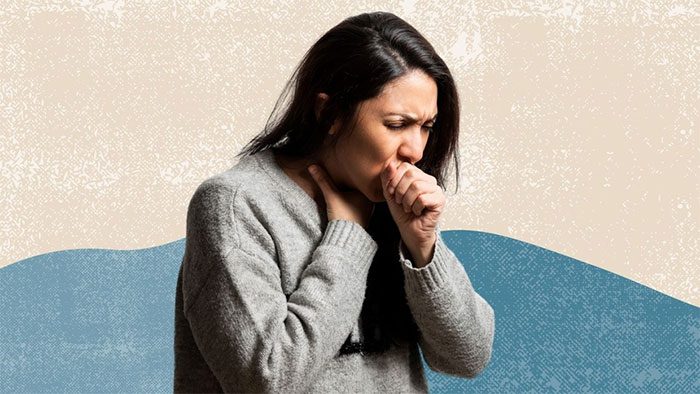Bronchitis is a localized disease affecting the bronchial tubes and may be accompanied by symptoms such as inflammation, swelling, persistent coughing, and mucus production.
There are two types of bronchitis: acute and chronic. Acute bronchitis is more common, with symptoms lasting a few weeks, but it usually does not lead to any long-term issues. In contrast, chronic bronchitis is more serious, can recur, and may not completely resolve.

Bronchitis can make patients feel fatigued and uncomfortable. (Image: Medicalnewstoday).
Typical Signs of Bronchitis
According to the National Health Service (NHS) of the United Kingdom, the symptoms of bronchitis can resemble those of a cold or flu. Generally, both acute and chronic bronchitis present respiratory-related signs, including:
- Chest congestion.
- Productive cough with clear, white, yellow, or green mucus.
- Shortness of breath.
- Wheezing or whistling sounds while breathing.
Symptoms of acute bronchitis may also include: body aches and chills; fatigue; low-grade fever; runny or stuffy nose; and sore throat.
Even after other symptoms of acute bronchitis resolve, the cough may persist for several weeks, despite the bronchial tubes healing and swelling subsiding. Chronic bronchitis is characterized by a cough that lasts at least three months and recurs for at least two consecutive years.

Persistent cough with mucus is a typical symptom in bronchitis patients. (Image: Everydayhealth).
Ways to Alleviate Bronchitis
According to WebMD, when you have an incessant cough due to bronchitis, you may seek various methods to stop it. Besides cough suppressants (which may have side effects like drowsiness, dizziness, or dry mouth), several other remedies can help you feel more comfortable.
Avoid Lung Irritants
Staying away from substances like smoke, chemical fumes, dust, and air pollution is the best way to prevent and treat bronchitis. If you smoke and find it hard to quit, talk to your doctor for appropriate treatment options. If you cannot avoid other irritants—such as if you have to work around them—consider wearing a mask and opening windows when possible.
Get Plenty of Rest
Infections and coughing due to bronchitis can leave you feeling extremely tired. Listen to your body and rest as much as possible, especially in the first few days after falling ill. If nighttime coughing disrupts your sleep, try using an extra pillow to elevate your head and prevent mucus from pooling in your throat.
Stay Hydrated
When you have bronchitis, it is crucial to thin the mucus in your chest so you can cough it out and breathe more easily. The best way to thin mucus is to drink plenty of fluids such as water, diluted fruit juices, herbal teas, and clear soups. Aim to drink 8 to 12 cups each day. Try to avoid alcohol and caffeine.
Inhale Steam
This is another effective method to thin and expel mucus from your body more quickly. First, pour hot water into a large heatproof bowl. Be cautious to avoid burns and do not use water that is too hot, especially when near children. Next, cover your head with a towel and lean over the bowl of hot water, using the towel to create a tent to trap the steam. Inhale the steam for up to 10 minutes.
You can also take a hot shower or sit in a steamy bathroom.
Use a Humidifier
A cool or warm mist humidifier in your bedroom will add moisture to the air while you sleep, which can help clear mucus. Be sure to clean the humidifier regularly to eliminate bacteria and mold.
Gargle with Salt Water
This can help remove some mucus covering the throat and soothe irritation. You can perform this several times a day to make your throat feel more comfortable.
Soothing Your Cough
Honey has been used as a remedy since ancient times. Sucking on a spoonful of honey or stirring it into warm herbal tea can help alleviate the annoying cough often associated with bronchitis and soothe a sore throat. However, do not give honey to children under one year of age, as it can cause botulism in infants.


















































